Intel X25-M SSD: Intel Delivers One of the World's Fastest Drives
by Anand Lal Shimpi on September 8, 2008 4:00 PM EST- Posted in
- Storage
The Generic MLC SSD Problem in the Real World
Based on the Iometer results I knew for sure that there was an issue with random write performance on these SSDs, the only common thread between them being the type of controller (JMicron JMF602) and the MLC flash devices being used (Samsung). But I wanted to see if I could get the high latency writes to appear in a real-world benchmark-able way.
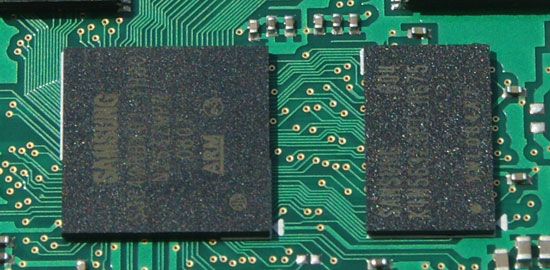
The Samsung SLC controller
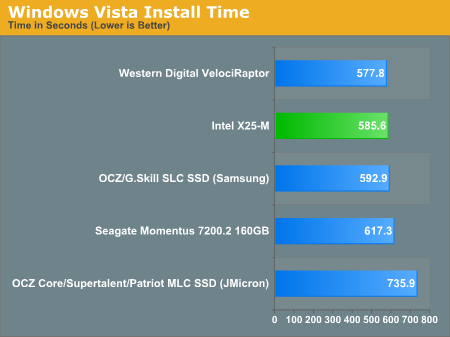
The first indication that something is wrong actually comes from running the Windows Vista install itself, the MLC drive takes 25% longer to complete the install (let’s just ignore the part about the full install not being fully functional upon completion). Clearly there’s an issue with write speed. I ran into something similar with OS X, but I didn't put it together until now.
The problems are far worse in Vista. While OS X will just pause until the data is written, Vista doesn’t seem to respond well to unusually long file write delays. I haven’t been able to get the Vista install to complete without errors on the OCZ Core drive. One install completed but I was greeted with this error as soon as I hit the desktop:
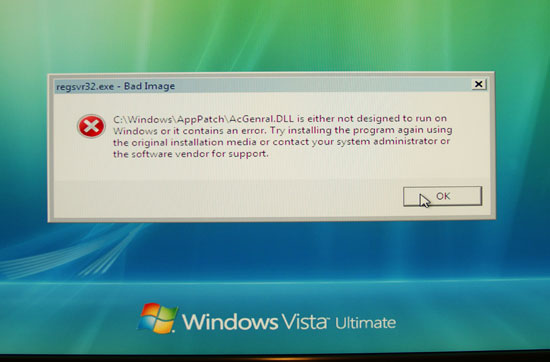
Trying to reinstall gave me this error even before I booted into Vista:
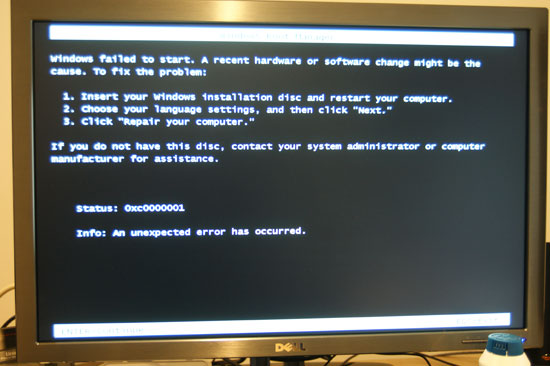
It looks like the Vista install doesn’t do well with significant delays when writing files to the disk. The only way I could actually get a reliable Vista install on the Core drive was by cloning another drive with a working Vista image on it.
For the next test I tried creating a 200MB archive of pictures:
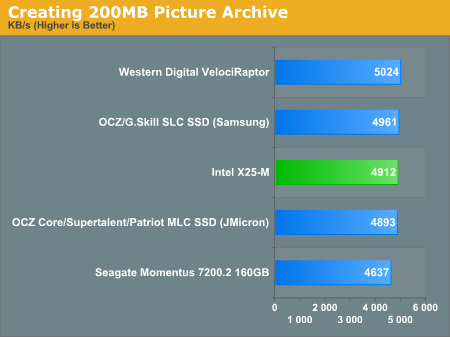
So far, so good. The OCZ Core performs no differently than the rest of the pack. Now let's try creating the same archive, but also extracting one at the same time:
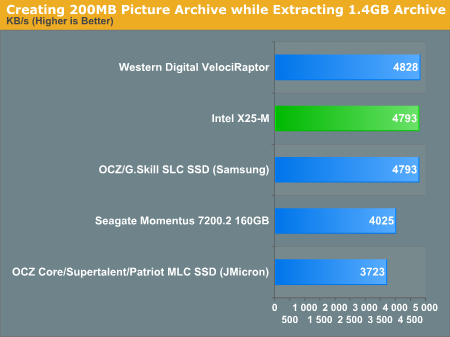
Ah-ha! Now we're on to something, the SLC and Intel MLC drives are both around 30% faster than the OCZ Core. Let's try creating the same archive but extracting a much larger one:
| Creating 200MB Archive | Extracting 5GB Archive | Number of Pauses | |
| SuperTalent (JMicron, MLC) | 83 seconds | 573 seconds | lots |
| Silicon Power (JMicron, MLC) | 128 seconds | 632 seconds | tons |
| OCZ Core (JMicron, MLC) | 60 seconds | 222.7 seconds | 20 |
| OCZ (Samsung, SLC) | 42 seconds | 94.7 seconds | 0 |
| Intel X25-M (Intel, MLC) | 42 seconds | 113.7 seconds | 0 |
| Seagate Momentus 7200.2 | 72 seconds | 260.6 seconds | 0 |
| Western Digital VelociRaptor | 46 seconds | 90.9 seconds | 0 |
You'll notice a new column called number of pauses; this column is the number of times all disk activity ceased on the system, causing the whole machine to stutter for a moment. You'll also notice that there are zeros in this column, unless the drive uses the JMicron controller. Also note the randomness of the problem, the OCZ, SuperTalent and Silicon Power drives all use the same hardware yet I saw tremendous variations between runs. This is a manually timed test but the rest of the drives didn't vary nearly as much.
It's also important to note that while the Seagate notebook drive performed similarly to the Core, it didn't suffer from the pauses. What this helps illustrate is the nature of the problem, it's very bursty - you get a period of very high performance followed by an abrupt stop. The abrupt stops, as we now know, are these 0 - 2 second write latencies where everything in the system is completely starved of data until the write is complete.
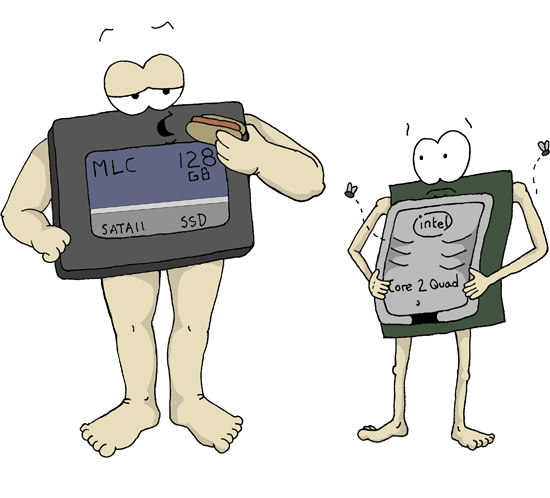
Poor hungry CPU, it just wants to eat. Comic by Laura of www.laurascomics.com
From the CPU's perspective, it expects new data on a nanosecond scale, waiting a full second for anything is deadly for performance.
Another way of quantifying the impact is looking at how long it takes to launch an application when we're in this high-latency write period. I tried extracting the same 5GB archive and launching PowerPoint 2007 or Photoshop CS3 (not at the same time).
| Launching PowerPoint 2007 While Extracting 5GB | Launching Photoshop CS3 While Extracting 5GB | |
| OCZ Core (JMicron, MLC) | 8.5 seconds | 24.3 seconds |
| OCZ (Samsung, SLC) | 2.8 seconds | 9.3 seconds |
| Intel X25-M (Intel, MLC) | 3.85 seconds | 10.5 seconds |
| Seagate Momentus 7200.2 | 21.3 seconds | 46.5 seconds |
| Western Digital VelociRaptor | 8 seconds | 23.5 seconds |
All of the drives took longer to launch the applications, but while the SLC and Intel MLC drives still performed in a league of their own, the MLC drives behaved like conventional hard drives. Try running an application while your disk is busy doing something else, or better yet, try running a couple - they take forever. SSDs fix that problem, or at least they're supposed to. These MLC drives don't, at least not always; thankfully the SLC drives and more importantly, the Intel MLC drive don't exhibit this problem.










96 Comments
View All Comments
aeternitas - Thursday, September 11, 2008 - link
Converting all your DVDs to divx is a silly idea. Why would you want to lose dynamic range and overall quality (no matter the settings) for a smaller movie size when 1TB costs 130$?SSD = Preformance (when done right)
HHD = Storage.
johncl - Tuesday, September 9, 2008 - link
Noise isnt a big problem on a 3.5" in a media pc as the other poster states. But heat can be a problem, especially if you plan on passively cool everything else in the computer. An SSD will solve both problems, but only if the SSD is the only disk in the system. From what I understand you want to have both in yours which makes sense since movies/music occupy a lot of space. In that case you will not experience any improved performance since the media would have to be read off the mechanical drive anyway.Your best bet would be to build yourself a small media server and put all noisy hot mechanical disks in that and use small SSDs on your media pc (and indeed any other pc). That way you get the best of both worlds, fast response on application startup/OS boot, silent and no heat - as well as a library of media. You would probably have to use a media frontend that caches information about all media on your server though so it doesnt have to wait on server harddisk spinup etc for every time you browse your media. Perhaps Vista Media Center already does this?
mindless1 - Thursday, September 11, 2008 - link
An SSD will not "solve" a heat problem. The hard drive adds only a small % of heat to a system and being lower heat density it has one of the less difficult requirements for cooling.Speed of the HTPC shouldn't be an issue, unlike a highly mixed use desktop scenario all one needs is to use stable apps without memory leaks then they can hibernate to get rid of the most significant boot-time waiting. Running the HTPC itself the OS performance difference would be trivial and the bitrate for the videos is easily exceeding by either storage type or an uncongested LAN.
piroroadkill - Tuesday, September 9, 2008 - link
To be honest most decent HDDs don't make significant noise anyway, even further quelled by grommets or suspending the drive.Also, the reads will occur on the drive you're reading the movie from - so if you plan to use an external HDD as the source, this will make no difference whatsoever.
dickeywang - Tuesday, September 9, 2008 - link
Imaging you have a 80GB SSD, with 75GB been already occupied by some existing data (OS, installed software, etc), so you only have 10GB space left, now lets say you write and then erase 100GB/day on this SSD, shouldn't the 100GB/day data all be written on the 5GB space? So each cell would be written 100GB/5GB=20cycle/day, so you will reach the 10000cycle/cell limit within less than 18months.Can someone tell me if the analysis above is correct? I guess when they say "100GB/day for 5 years", they should really take into account how much storage space that is un-occupied on the SSD, right?
johncl - Tuesday, September 9, 2008 - link
A good wear leveling algorithm can move about "static" blocks so that their cells are also available for wear. I do not know if the current implementations use this though. Anyone know this?Lux88 - Tuesday, September 9, 2008 - link
I remember reading a number of SSD reviews, but it's first time I read about the pauses. Indeed, quick search revealed 5 articles, starting from May 2007, but the conclusions only mentioned a high price and a small capacity as drawbacks. Nothing about freezing nor pauses. Some of these 5 probably were SCL-drives, some MLC.It's funny how a simple multitasking test can reveal an Achille's heel of large group of products, just when a product appears that doesn't suffer from this particular drawback.
Overall good article and good info. So good that all the previous articles on the matter of SSDs on this site seem bad in comparison. Thanks for the info anyway, better late than never ;).
eva2000 - Tuesday, September 9, 2008 - link
If the OCZ Core controller does indeed have 16KB on chip cache for read/writes maybe that's the problem as OCZ Core pdf states for their SSD"each page contains 4 Kbytes of data, however, because of the parallelism at the back end of the controller, every access includes simultaneous opening of 16 pages for a total accessible data contingent of 64 Kbytes"
????
araczynski - Tuesday, September 9, 2008 - link
looks quite promising. maybe within about 2 years they'll get the bugs worked out, a more realistic price, and an extended life span, and i'll replace my regular drives.yyrkoon - Tuesday, September 9, 2008 - link
"No one really paid much attention to Intel getting into the SSD (Solid State Disk) business. We all heard the announcements, we heard the claims of amazing performance, but I didn't really believe it. After all, it was just a matter of hooking up a bunch of flash chips to a controller and putting them in a drive enclosure, right? "You mean you did not pay attention? I know I did, because Intel has always been serious with things of this nature. That and they are partnered with Crucial(Micron) right ?. . . Now if this was some attempt at sarcasm, or a joke . . .
Seriously, and I mean VERY seriously, I was excited when Anandtech 'reported' that Intel/Micron were going to get into the SSD market. After all affordable SSDs are very desirable, never mind affordable/very good performing SSDs. That, and I knew if Intel got into the market, that we would not have these half-fast implementations that we're seeing now from these so called 'SSD manufactures'. Well, even Intel is not impervious to screw ups, but they usually learn by their mistakes quickly, and correct them. Micron (most notably Crucial) from my experience does not like to be anything but the best in what they do, so to me this seemed like a perfect team, in a perfect market. Does this mean I think Micron is the best ? Not necessarily. Lets me just say that after years of dealing with Crucial, I have a very high opinion of Crucial/Micron.
"What can we conclude here? SSDs can be good for gaming, but they aren't guaranteed to offer more performance than a good HDD; and Intel's X25-M continues to dominate the charts."
Are we reading the same charts ? These words coming from the mouth of someone who sometimes mentions even the most minuscule performance difference as being a 'clear winner' ? Regardless, I think it *is* clear to anyone willing to pay attention to the charts that the Intel SSD "dominates". Now whether the cost of admission is worth this performance gain is another story altogether. I was slightly surprised to see a performance gain in FPS just by changing HDDS, and to be honest I will remain skeptical. I suppose that some data that *could* effect FPS performance could be pulled down while the main game loop is running.
Either way, this is a good article, and there was more than enough information here for me(a technology junky). Now lets hope that Intel lowers the cost of these drives to a more reasonable price(sooner rather than later). The current price arrangement kind of reminds me of CD burner prices years ago.